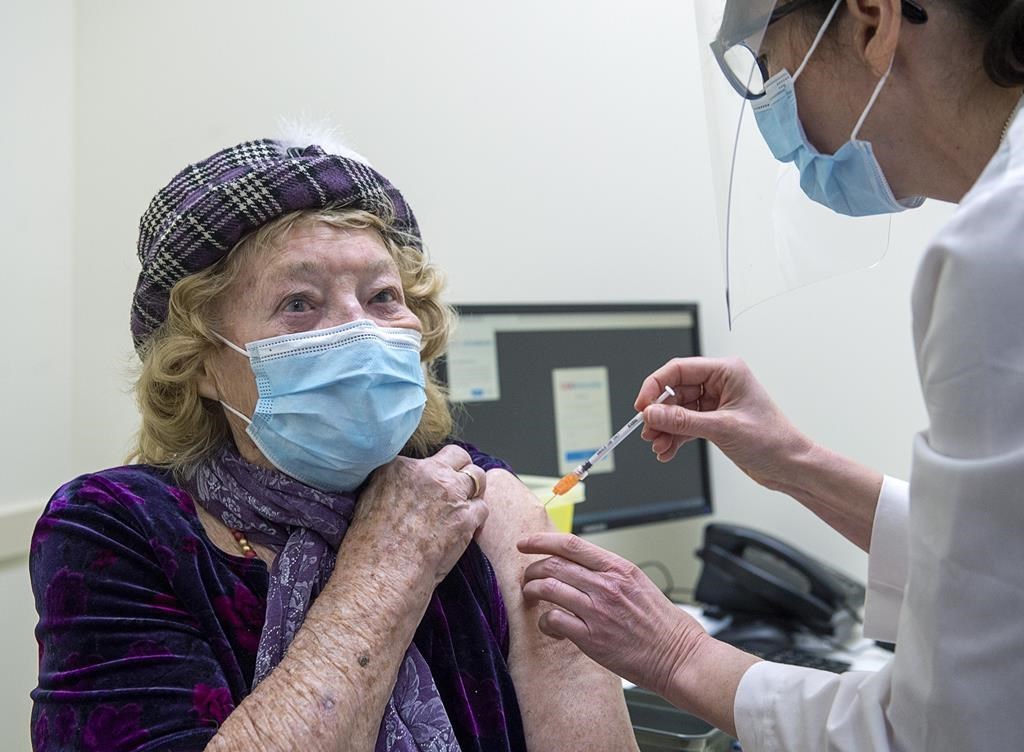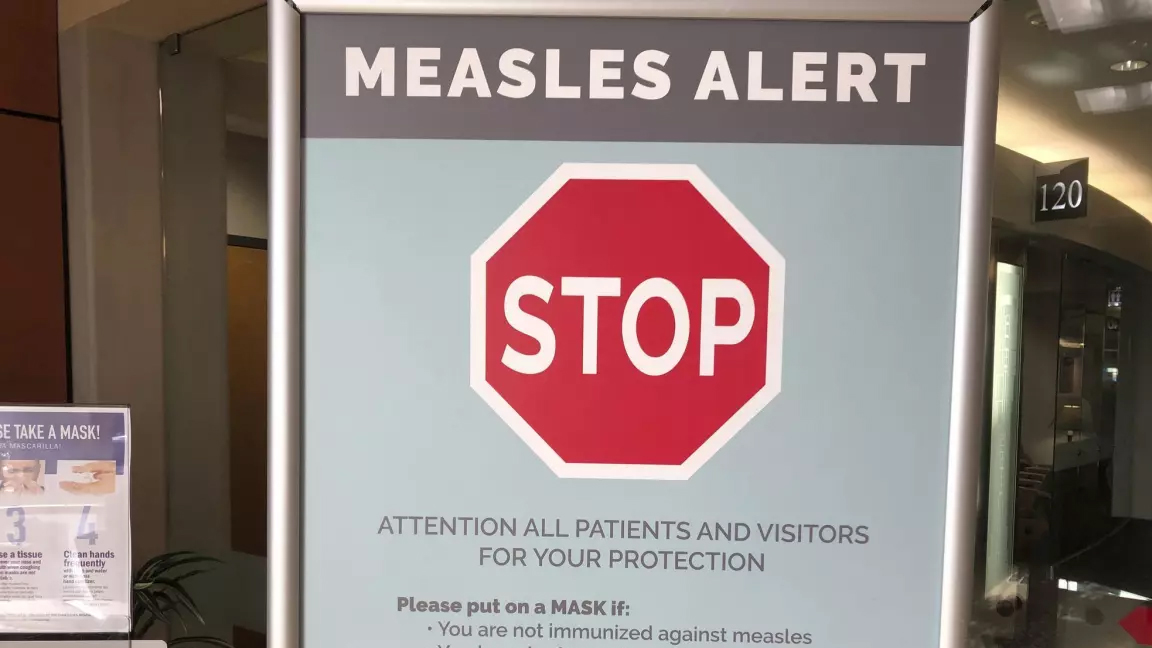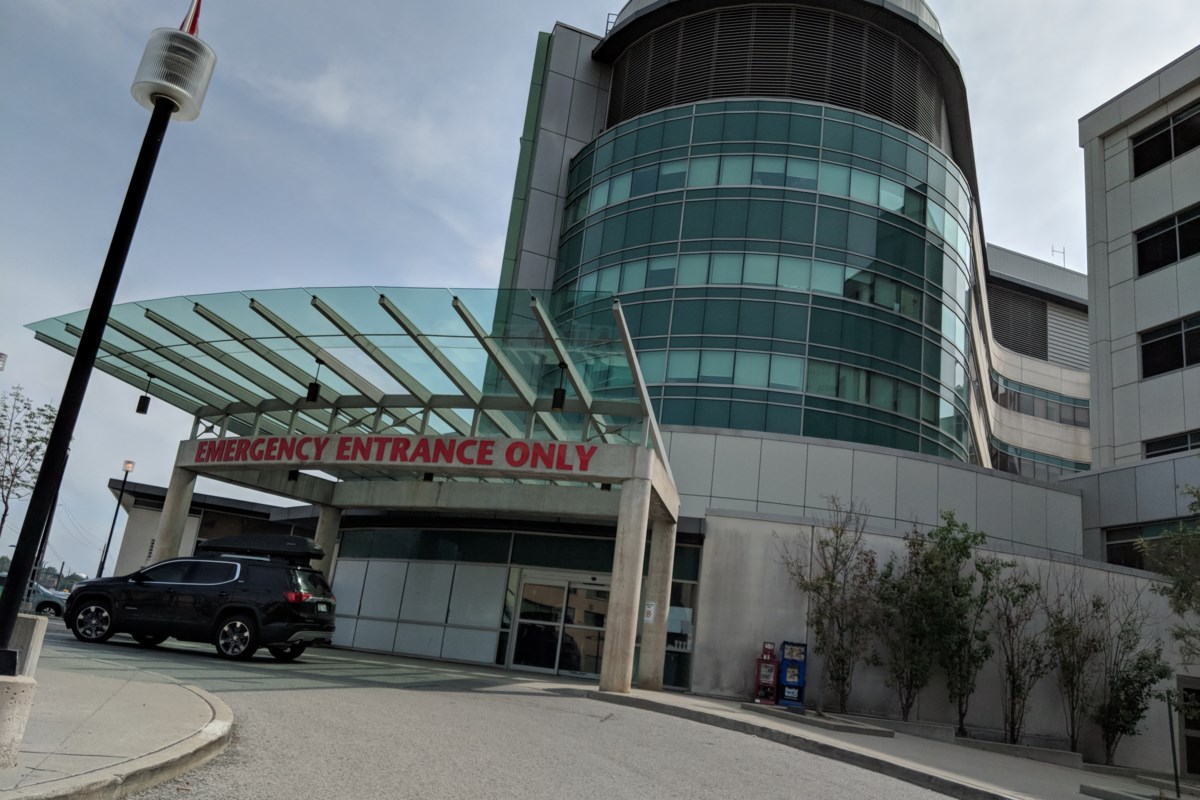Health
Research raises questions over delayed second vaccine doses for seniors – Vancouver Is Awesome

TORONTO — More questions are being raised about how long second shots of the COVID-19 vaccine can be delayed for seniors and other immunocompromised people.
The federal body that advises how vaccines be deployed said Thursday it’s reviewing a Vancouver study that found long-term care residents had a weaker immune response to their first dose of the Pfizer-BioNTech vaccine than younger healthy adults.
After supplies slowed to a trickle earlier this year, the National Advisory Committee on Immunization said provinces and territories can delay second doses by as long as four months.
That’s instead of the recommended schedule that spaces out the two-dose Pfizer-BioNTech and Moderna vaccines by three to four weeks, and the AstraZeneca product by four to 12 weeks.
Committee chair Dr. Caroline Quach said Thursday that NACI is looking at the Vancouver research, which found a weaker antibody response among older recipients but did not measure whether seniors were more likely to fall sick or die.
She said the findings will be assessed along with data from Quebec and the United Kingdom.
“What is so difficult with this disease is that there is no correlate of protection. That means that the presence and quantity of antibody present does not mean protection, or lack thereof,” Quach said in an email to The Canadian Press.
“Based on all those data, NACI will see if exceptions to the extended interval are necessary, keeping in mind that we are managing risk at a population level: the more people are vaccinated, the more likely we are to stop transmission, which will also be protective for the most vulnerable who may not mount an optimal response.”
The Vancouver data, funded by the COVID-19 Immunity Task Force, has yet to be peer-reviewed but adds to concerns about the rollout strategy of provinces including Ontario, Manitoba, Saskatchewan, Alberta, and British Columbia.
Task force director Dr. Tim Evans said the findings underscore a need to monitor senior recipients very carefully after their first shot.
“The immune response is so complicated and we still don’t fully understand what are called the correlates of protection,” Evans said from Montreal, where he is director and associate dean of the school of population and global health at McGill University.
“The most important takeaway from this study is we have to be very vigilant in monitoring the followup for the elderly, or immunocompromised with respect to extending the vaccine dose beyond what’s recommended.”
Evans stressed that older people in both long-term care and the community are well-protected for many weeks by a single dose of an mRNA vaccine, but said there may be limits to how long some people should wait for their second dose.
He said COVID-19 vaccines have already been associated with dropping hospitalizations and deaths in Canada, but expected NACI may have to refine its advice for how they be used in various populations.
“We’ve got multiple vaccines, they all work a little bit differently and so we know that we don’t have a one-size-fits-all approach,” he said, adding that long-term care residents may be more vulnerable than seniors in the community.
“We’re going to have to get used to working with different approaches for different age groups with different vaccines over the coming months as the vaccine rollout continues.”
The director of geriatrics at Toronto’s Sinai Health said a delayed-dose strategy makes little sense for a population already known to have a less-robust response to vaccines.
Dr. Samir Sinha said there’s already enough evidence for NACI to revise its advice, suggesting some urgency as he pointed to statistics that find 96 per cent of COVID-19 linked deaths are people over the age of 60.
“As a geriatrician, I’m becoming increasingly uncomfortable about the strategy of delaying these doses for older people and in particular, older people living in congregate care settings, and those who are highly vulnerable,” said Sinha.
Sinha acknowledged that NACI considers an array of factors in determining its guidelines and at the time of its March 3 decision, pressures included dwindling vaccine supplies, emerging variants and fears of a looming third wave.
Earlier Thursday, Health Canada’s chief medical adviser Dr. Supriya Sharma noted her agency – a separate body from NACI – approved the vaccines for use according to their respective labels.
She also said NACI’s advice will evolve as new science becomes available.
“I think it does make sense that we potentially have a more nuanced recommendation around that delayed second dose, but those conversations are ongoing,” Sharma said.
Principal investigator Dr. Marc Romney, an associate professor at the University of British Columbia, said not only did his study find LTC residents produced lower levels of antibodies, the antibodies they produced were less adept at blocking the SARS-CoV-2 virus from binding to its target cells.
“You don’t want to be leaving a large segment of society that’s already borne the brunt of the pandemic vulnerable to infection, awaiting a second dose – that is the potential issue here,” said Romney, medical leader for medical microbiology and virology at St. Paul’s Hospital, Providence Health Care.
“Hospitalizations are increasing again. And we have seen some outbreaks in long-term care facilities where people have been vaccinated, which is also concerning.”
He and a research team co-led by Dr. Zabrina Brumme of the BC Centre for Excellence in HIV/AIDS and Dr. Mark Brockman of Simon Fraser University analyzed blood samples collected from 18 long-term care residents and 12 healthcare workers.
They were taken in late 2020 and early 2021 before vaccination and compared to changes after participants received their first dose.
This report by The Canadian Press was first published March 25, 2021.
Cassandra Szklarski, The Canadian Press
Health
AHS confirms case of measles in Edmonton – CityNews Edmonton


Alberta Health Services (AHS) has confirmed a case of measles in Edmonton, and is advising the public that the individual was out in public while infectious.
Measles is an extremely contagious disease that is spread easily through the air, and can only be prevented through immunization.
AHS says individuals who were in the following locations during the specified dates and times, may have been exposed to measles.
- April 16
- Edmonton International Airport, international arrivals and baggage claim area — between 3:20 p.m. and 6 p.m.
- April 20
- Stollery Children’s Hospital Emergency Department — between 5 a.m. to 3 p.m.
- April 22
- 66th Medical Clinic (13635 66 St NW Edmonton) — between 12:15 p.m. to 3:30 p.m.
- Pharmacy 66 (13637 66 St NW Edmonton) — between 12:15 p.m. to 3:30 p.m.
- April 23
- Stollery Children’s Hospital Emergency Department — between 4:40 a.m. to 9:33 a.m.
AHS says anyone who attended those locations during those times is at risk of developing measles if they’ve not had two documented doses of measles-containing vaccine.
Those who have not had two doses, who are pregnant, under one year of age, or have a weakened immune system are at greatest risk of getting measles and should contact Health Link at 1-877-720-0707.
Symptoms
Symptoms of measles include a fever of 38.3° C or higher, cough, runny nose, and/or red eyes, a red blotchy rash that appears three to seven days after fever starts, beginning behind the ears and on the face and spreading down the body and then to the arms and legs.
If you have any of these symptoms stay home and call Health Link.
In Alberta, measles vaccine is offered, free of charge, through Alberta’s publicly funded immunization program. Children in Alberta typically receive their first dose of measles vaccine at 12 months of age, and their second dose at 18 months of age.
Health
U.S. tightens rules for dairy cows a day after bird flu virus fragments found in pasteurized milk samples – Toronto Star


/* OOVVUU Targeting */
const path = ‘/news/canada’;
const siteName = ‘thestar.com’;
let domain = ‘thestar.com’;
if (siteName === ‘thestar.com’)
domain = ‘thestar.com’;
else if (siteName === ‘niagarafallsreview.ca’)
domain = ‘niagara_falls_review’;
else if (siteName === ‘stcatharinesstandard.ca’)
domain = ‘st_catharines_standard’;
else if (siteName === ‘thepeterboroughexaminer.com’)
domain = ‘the_peterborough_examiner’;
else if (siteName === ‘therecord.com’)
domain = ‘the_record’;
else if (siteName === ‘thespec.com’)
domain = ‘the_spec’;
else if (siteName === ‘wellandtribune.ca’)
domain = ‘welland_tribune’;
else if (siteName === ‘bramptonguardian.com’)
domain = ‘brampton_guardian’;
else if (siteName === ‘caledonenterprise.com’)
domain = ‘caledon_enterprise’;
else if (siteName === ‘cambridgetimes.ca’)
domain = ‘cambridge_times’;
else if (siteName === ‘durhamregion.com’)
domain = ‘durham_region’;
else if (siteName === ‘guelphmercury.com’)
domain = ‘guelph_mercury’;
else if (siteName === ‘insidehalton.com’)
domain = ‘inside_halton’;
else if (siteName === ‘insideottawavalley.com’)
domain = ‘inside_ottawa_valley’;
else if (siteName === ‘mississauga.com’)
domain = ‘mississauga’;
else if (siteName === ‘muskokaregion.com’)
domain = ‘muskoka_region’;
else if (siteName === ‘newhamburgindependent.ca’)
domain = ‘new_hamburg_independent’;
else if (siteName === ‘niagarathisweek.com’)
domain = ‘niagara_this_week’;
else if (siteName === ‘northbaynipissing.com’)
domain = ‘north_bay_nipissing’;
else if (siteName === ‘northumberlandnews.com’)
domain = ‘northumberland_news’;
else if (siteName === ‘orangeville.com’)
domain = ‘orangeville’;
else if (siteName === ‘ourwindsor.ca’)
domain = ‘our_windsor’;
else if (siteName === ‘parrysound.com’)
domain = ‘parrysound’;
else if (siteName === ‘simcoe.com’)
domain = ‘simcoe’;
else if (siteName === ‘theifp.ca’)
domain = ‘the_ifp’;
else if (siteName === ‘waterloochronicle.ca’)
domain = ‘waterloo_chronicle’;
else if (siteName === ‘yorkregion.com’)
domain = ‘york_region’;
let sectionTag = ”;
try
if (domain === ‘thestar.com’ && path.indexOf(‘wires/’) = 0)
sectionTag = ‘/business’;
else if (path.indexOf(‘/autos’) >= 0)
sectionTag = ‘/autos’;
else if (path.indexOf(‘/entertainment’) >= 0)
sectionTag = ‘/entertainment’;
else if (path.indexOf(‘/life’) >= 0)
sectionTag = ‘/life’;
else if (path.indexOf(‘/news’) >= 0)
sectionTag = ‘/news’;
else if (path.indexOf(‘/politics’) >= 0)
sectionTag = ‘/politics’;
else if (path.indexOf(‘/sports’) >= 0)
sectionTag = ‘/sports’;
else if (path.indexOf(‘/opinion’) >= 0)
sectionTag = ‘/opinion’;
} catch (ex)
const descriptionUrl = ‘window.location.href’;
const vid = ‘mediainfo.reference_id’;
const cmsId = ‘2665777’;
let url = `https://pubads.g.doubleclick.net/gampad/ads?iu=/58580620/$domain/video/oovvuu$sectionTag&description_url=$descriptionUrl&vid=$vid&cmsid=$cmsId&tfcd=0&npa=0&sz=640×480&ad_rule=0&gdfp_req=1&output=vast&unviewed_position_start=1&env=vp&impl=s&correlator=`;
url = url.split(‘ ‘).join(”);
window.oovvuuReplacementAdServerURL = url;
Infected cows were already prohibited from being transported out of state, but that was based on the physical characteristics of the milk, which looks curdled when a cow is infected, or a cow has decreased lactation or low appetite, both symptoms of infection.
function buildUserSwitchAccountsForm()
var form = document.getElementById(‘user-local-logout-form-switch-accounts’);
if (form) return;
// build form with javascript since having a form element here breaks the payment modal.
var switchForm = document.createElement(‘form’);
switchForm.setAttribute(‘id’,’user-local-logout-form-switch-accounts’);
switchForm.setAttribute(‘method’,’post’);
switchForm.setAttribute(‘action’,’https://www.thestar.com/tncms/auth/logout/?return=https://www.thestar.com/users/login/?referer_url=https%3A%2F%2Fwww.thestar.com%2Fnews%2Fcanada%2Fu-s-tightens-rules-for-dairy-cows-a-day-after-bird-flu-virus-fragments-found%2Farticle_985b0bac-0252-11ef-abc6-eb884d6a1f0c.html’);
switchForm.setAttribute(‘style’,’display:none;’);
var refUrl = document.createElement(‘input’); //input element, text
refUrl.setAttribute(‘type’,’hidden’);
refUrl.setAttribute(‘name’,’referer_url’);
refUrl.setAttribute(‘value’,’https://www.thestar.com/news/canada/u-s-tightens-rules-for-dairy-cows-a-day-after-bird-flu-virus-fragments-found/article_985b0bac-0252-11ef-abc6-eb884d6a1f0c.html’);
var submit = document.createElement(‘input’);
submit.setAttribute(‘type’,’submit’);
submit.setAttribute(‘name’,’logout’);
submit.setAttribute(‘value’,’Logout’);
switchForm.appendChild(refUrl);
switchForm.appendChild(submit);
document.getElementsByTagName(‘body’)[0].appendChild(switchForm);
function handleUserSwitchAccounts()
window.sessionStorage.removeItem(‘bd-viafoura-oidc’); // clear viafoura JWT token
// logout user before sending them to login page via return url
document.getElementById(‘user-local-logout-form-switch-accounts’).submit();
return false;
buildUserSwitchAccountsForm();
console.log(‘=====> bRemoveLastParagraph: ‘,0);
Health
New technology to advance women’s cancer care at Southlake


|
|
NEWS RELEASE
SOUTHLAKE REGIONAL HEALTH CENTRE
**************************
This Cancer Awareness Month, Southlake is adding advanced technologies to detect and treat breast cancer and other women’s cancers thanks to generous community donor support, most recently through the HERE is Where Cancer Meets its Match campaign. New cancer care technology, including new mammography machines, the MyoSure System and the MOLLI 2® System will make a measurable impact in diagnosing and treating women’s cancers in the communities Southlake serves.
Southlake is installing three new mammography machines to expand its breast cancer screening program to 1,500 more women each year. Two of these machines have new biopsy capabilities that will reduce the number of cancelled exams due to equipment failure, ensuring timely care for women. Women ages 40 to 49 years old will be able to self-refer for publicly funded mammograms through the Ontario Breast Screening Program starting this fall.
“Early detection is critical when treating breast cancer and other women’s cancers,” said Lorrie Reynolds, Director, Regional Cancer Program at Southlake. “We treat more than 1,700 breast cancer patients at Southlake every year. By adding advanced technology, like the new mammography machines, we’re ensuring women have the best experience at Southlake.”
Southlake is also introducing the MyoSure System, an innovative technology that can help detect female reproductive cancers. Damaged tissue in a woman’s uterus such as fibroids and polyps can now be removed in a precise, minimally invasive procedure that leaves the rest of the uterus intact. This will improve the overall patient experience by supporting faster recovery, reducing the risk of infection and giving more women the option to have children. An estimated 200 women per year will benefit from the MyoSure System.
The new mammography machines and the MyoSure System build on Southlake’s recent investment in the MOLLI 2® System, a made-in-Canada wire-free breast localization technology. This technology is considerably less invasive and more accurate when compared to wire-guided localization, resulting in a better patient experience and improved cosmetic outcomes. More than 200 women each year will benefit from this innovative medical device as they are treated for breast cancer at Southlake.
“As a clinician caring for women with cancer in our community, I’m incredibly proud of the work Southlake is doing to advance women’s health and improve patient experiences,” said Sara Temple, MD, Surgical Oncologist and Chief of Surgery at Southlake. “Women who visit Southlake can be confident that they are receiving leading edge care, close to home when they need it most.”
The World Health Organization anticipates a 77 per cent increase in cancer diagnoses by 2050. Southlake serves some of the fastest growing communities in Canada and anticipates that the number of patients requiring cancer care will grow. By investing in new technology, Southlake is ensuring that women in the communities it serves have access to leading edge cancer care. All of these investments were funded with support from community donors who generously gave to Southlake to support investments into women’s health at the hospital.
“The generosity of our donor community and the impact they have made for women receiving cancer diagnosis and treatment at Southlake is something we can all take great pride in,” said Jennifer Ritter, President and CEO of Southlake Foundation. “From our Women’s Health Initiative donors supporting new mammography machines, to the Ladies in Philanthropy for Southlake funding the MOLLI 2 System, to our long-standing partners The Edge Benefits and Pheasant Run Golf Club enabling the introduction of MyoSure System through their joint annual charity golf tournament, we are incredibly lucky to share a vision of access to exceptional care for everyone who depends on Southlake when they need us most. Thank you, to every donor who contributed to these important upgrades to care for women.”
Southlake Foundation’s HERE is Where Cancer Meets its Match campaign supports the Stronach Regional Cancer Centre at Southlake. For more information or to make a donation, visit: southlake.ca/HERE.





-
News21 hours ago
Amid concerns over ‘collateral damage’ Trudeau, Freeland defend capital gains tax change
-
Art19 hours ago
The unmissable events taking place during London’s Digital Art Week
-



 Politics23 hours ago
Politics23 hours agoHow Michael Cohen and Trump went from friends to foes
-



 Real eState24 hours ago
Real eState24 hours agoBlending Function and Style: The Best Garage Door Designs for Contemporary Homes
-
News22 hours ago
U.K. tabloids abuzz with Canadian’s ‘Loch Ness monster’ photo
-
Health24 hours ago
Interior Health delivers nearly 800K immunization doses in 2023
-



 Politics22 hours ago
Politics22 hours agoPolitics Briefing: Saskatchewan residents to get carbon rebates despite province’s opposition to pricing program
-



 Tech24 hours ago
Tech24 hours agoDownhill Bikes of Sea Otter – Part 2





